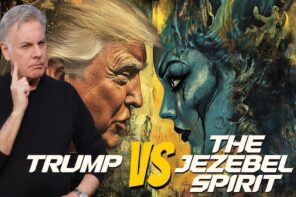“Never trust a fucking Angel.” So exclaims a tortured human slave to Christopher Walken’s Gabriel in the surprisingly good 1995 religious horror treat The Prophecy. Walken plays an angry archangel who, like Lucifer before him (campily portrayed by Viggo Mortensen), has launched a new war in heaven. Walken’s Gabriel would never make it onto grandma’s Christmas card. He gives the archangel a mafioso swagger; God’s messenger as portrayed by “the King of New York.”
And what sparks this heavenly turf war? Gabriel, it turns out, hates us. Humans are “talking monkeys” who don’t deserve to be in heaven. Worse, God doesn’t talk to him anymore (possibly because his hobby appears to be murdering humans and reanimating them as his soulless slaves).
Legion (2010), by first time director Scott Stewart, cribs a bit from The Prophecy but takes things a bit farther than the unwarranted cultural optimism of the mid-’90s would allow. In Legion, God is simply sick of us and he’s going to show his displeasure not by water or the fire next time, but instead by angels—lots and lots of angry angels.
Legion gives us a God that, as the film itself explains “is tired of the bullshit.” Lucky for us, the archangel Michael is on our side and a waitress in the Arizona desert is giving birth to a child who embodies some kind of messianic hope and so must be kept alive. The thin and mostly uninspired plot plays out with a host of angelic terminators trying to finish off this divine John Connor, as Michael tries to prevent his murder.
What is interesting, however, is that Stewart never lets God off the hook in the way one might expect. I was certain that we’d learn at the end that either this was a plot by a certain fallen angel—better known as Satan—to annihilate the human race, or that the angels had decided to act on their own—against God’s will and somehow without his divine foreknowledge—to finish off humanity. This turns out not to be the case. So, while Legion is not the first film to make use of angels in a horror film, it is perhaps the most theologically inventive. Moreover, it represents an interesting reaction to several decades of angelmania in American culture, a fascination with beings that Billy Graham once referred to as “God’s Secret Agents.”
Angels in Apocalyptic America
Fascination with angels in popular evangelical culture rose in the 1970s when looking for the apocalypse became a growth industry. Hal Lindsey’s wildly popular Late Great Planet Earth insisted that the daily newspaper promised signs of the end. His follow-up, Satan is Alive and Well on Planet Earth, placed the concept of “spiritual warfare” in the center of Christian experience (which, I argue in Satan in America, actually forms a central theme in the American religious experience). Angels, portrayed as warriors fighting beside evangelical Christians, became a hugely popular representation of spiritual life.
Billy Graham’s 1975 Angels: God’s Secret Agents increased this fascination with angels, demons, and the possibility of spiritual warfare. Graham insisted that what he viewed as an increased interest in all things spiritual meant that angels had become especially active on Earth. These angels, more active than usual in the last days, provide constant help, intervene on behalf of believers (not human beings in general) and even engage in the rather creepy sounding “divine surveillance.”
I suspect the evangelical interest in angels has its roots in two important cultural and religious phenomena. First, I would suggest that a real theological quandary for fundamentalists helped to create an interest in angelical helpers. Fundamentalist Christianity insists that it offers a way to know and experience God. But how does one know the God of Armageddon? In the apocalyptic schema he does, after all, slaughter millions during the “Tribulation period,” seemingly without mercy.
In this brand of Christianity even Jesus can seem fairly savage, portrayed as a warrior-deity by Hal Lindsey (and later in the Left Behind series) who literally fulfills the imagery of the Book of Revelation on his Second Coming, riding a white horse (much like the terrible horseman that represents death) and slaughtering his enemies till blood runs in rivers. What could possibility mitigate this almost Lovecraftian portrayal of divine forces? In an American evangelical Protestantism that had no room for the saints of Catholic spirituality, angels offered a promising means of intercession with the seemingly brutal heavenly realms.
Second, I would suggest that much of the evangelical fascination with angels grew out of the interest in the concept of “spiritual warfare,” angels fighting by the side of human beings. This image of the spiritual life as warfare was encouraged by the growth of fantasy literature in the 1960s and 70s. In 1965, the first paperback edition of Tolkien’s Lord of the Rings appeared in the United States and became an instant hit, spawning numerous imitators. “Sword and Sorcery” epics became a staple of American popular culture.
Imagining Angelic warriors ranked in hierarchies, opposing similar diverse armies of demonic hordes proved very appealing to a generation of Christians whose imaginative life had been informed by legions of humans, wizards and elves facing off against goblins, orcs, and trolls. Spiritual warfare, with angelic warriors in the lead, became Dungeons & Dragons for the Bible-thumping set. This became explicit in the emergence of evangelical Christian fiction such as This Present Darkness, in which angelic generals and foot-soldiers swarmed around evangelicals and non-believers, turning the spiritual realm into a medieval battleground.
At least in Legion, angels have the good sense to forego the broad swords and blow shit up.
Angels for the Rest of Us
In the 1990s, evangelical Christians certainly had no monopoly on angelic visitations. Rumors of angels could be heard everywhere.
The best example of American angel-obsession may have been the surprisingly popular television series Touched by An Angel. The long-running hit series featured Roma Downey and Della Reese as angelic messengers sent to bring hope to hapless humans. The pair (later joined by Valerie Bertinelli) served up a syrupy but powerful advertisement for a greeting-card brand of religious faith with little theological definition but a healthy serving of “chicken soup for the soul” (a franchise that itself became popular in the same era). Interestingly, the successful hit left its audience believing that God had a great deal of interest in helping middle-class Americans with their personal problems and conflicts, though He and His messengers seemed to spend little time dealing with war, famine, and social injustice.
Feel-good angelmania suddenly appeared everywhere. The hugely popular Ask Your Angels (1992) told its readers that they were surrounded with heavenly helpers interested in providing “empowerment.” “Angel Tarot Cards” became popular, as did images, sculptures, and tchotchkes of angels for home and garden. Angels, thoroughly domesticated, became a spiritual accoutrement for prosperous yet troubled baby-boomers adrift in a suburban wasteland of McMansions and Lincoln Navigators.
Then along came The Prophecy with its terrifying, I’m-a-gonna-rip-your-face-off angels. Not far behind was Kevin Smith’s brilliant Dogma that dealt, in part, with a pair of fallen angels (Ben Affleck and Matt Damon) hoping for redemption. This pair keenly feels their separation from God and describes its effects in terms that St. Augustine could have written (showing off some of Smith’s Catholic-school education). Popular culture started suggesting that angels were a lot more dangerous than Della Reese had made them seem.
Do the angry angels of Legion, and their roots in angelmania mean that, for many Americans, God is absent? And do these creatures, heavenly and horrific, fill the vacuum? They have certainly fulfilled some important symbolic hole over the last several decades; served as some kind of mythological placeholder for millions. Notably, most of the angel films of the ’90s had a God either entirely absent or, in the case of Dogma, rather easily put out of action. Even Touched by an Angel seemed to suggest that God was deeply concerned but mostly unable or unwilling to get directly involved, sending along his messengers to patch things up for humanity (or select portions of it) now and again.
Ironically, using angels as characters for horror films, or even reimagining them so creatively as Kevin Smith does in Dogma, may offer a way for Americans to reflect on the spiritual life in a more serious and less narcissistic fashion. Angels are typically portrayed as majestic creatures, portents and warnings, signals of the overwhelming realities of life and of death. They are not PAs for born-again Christians or new-age talismans. Stories of angels as harbingers of divine wrath can at least have the effect of reminding us that spirituality, as imagined by most of the world’s true prophets, bears a stronger resemblance to being alone on a raft in the midst of an angry sea than baking a pie. As Rilke writes in the opening apostrophe of Duino Elegies, “every Angel is Terrible.”
Or put more simply: “never trust a fucking angel.”




